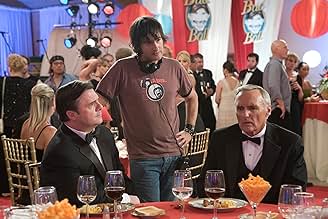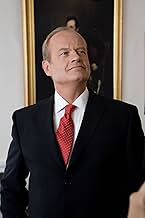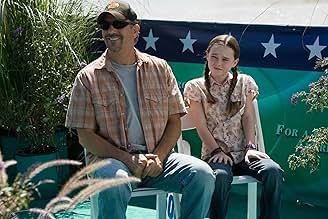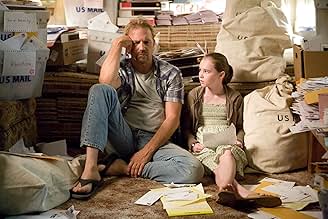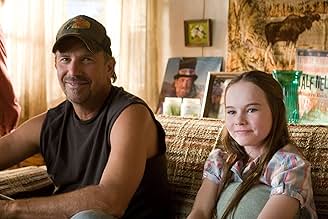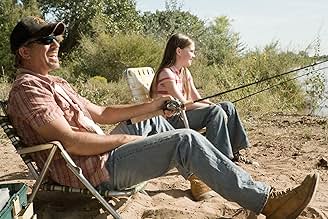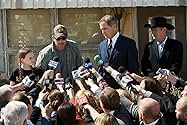CALIFICACIÓN DE IMDb
6.1/10
20 k
TU CALIFICACIÓN
En un notable giro de los acontecimientos, el resultado de la elección presidencial se reduce al voto de un hombre.En un notable giro de los acontecimientos, el resultado de la elección presidencial se reduce al voto de un hombre.En un notable giro de los acontecimientos, el resultado de la elección presidencial se reduce al voto de un hombre.
- Dirección
- Guionistas
- Elenco
- Premios
- 1 nominación en total
Charles Esten
- Lewis
- (as Charles 'Chip' Esten)
- Dirección
- Guionistas
- Todo el elenco y el equipo
- Producción, taquilla y más en IMDbPro
Opiniones destacadas
It sounds implausible and impossiblethat a man's accidental flub-up in the voting booth causes his vote to stall the election and coincidentally determine the next U.S. President. But Swing Vote has a great time using that as a platform to tell a really cool tale.
Besides, the movie wants to move past that impossibility anyway (suspension of disbelief, right?), and into the fun stuff. Swing Vote isn't necessarily about the likelihood of the above-mentioned phenomenon occurring; it's about bigger things, things like the nature of freedom in America, the right to vote, politicians and their campaigns, and various issues that unite and divide America as a nation.
Ernest "Bud" Johnson (Kevin Costner) is a beer-drinking, blue-collar simpleton whose wife left both him and his daughter, Molly, for a Nashville singing career. Molly (Madeline Carroll), a precocious little girl who is passionate about politics and the preservation of her country, and unfortunately for her, Bud couldn't care less, even if her were sober. Molly seems to be the parent in the relationship, taking care of Bud's daily hangovers and prodding him to get up for work.
Molly is in constant frustration with her father's apathy toward life and her interests, and is perturbed when Bud seemingly sets in motion an ironic, history-making turn of events where his vote actually ends up being the deciding factor in the election. This forces the Presidential candidates to campaign only to win Bud's vote. Along the way we are treated to a satirical look at the lengths campaign managers and the candidates will go simply to get a vote.
How this plays out is both hilarious and sobering, as well as inspiring and totally enjoyablethanks to some good storytelling and direction, as well as an excellent cast of talented actors who make this movie shine. The brightest stars on the screen, however, are Kevin Costner and Madeline Carroll as Bud and Molly. Costner has found a perfect role in the dimwitted Bud, and Carroll as Molly is a brilliant young actor whose performance almost brought me to tears at one point.
Like I mentioned before, though, Swing Vote is not a simple "voting is your civic duty" story. While the importance of voting is emphasized as both a privilege and a blessing in a great country, Swing Vote goes over the issues that affect daily life in America, and through the story reminds us how we can take some sort of action to better that life.
However, Swing Vote is careful not to play too much on the emotional arguments regarding various issues like abortion, immigration and gay marriage, making the movie all the more charming. There are a few emotionally charged scenes in the movie that give weight to the hilarity throughout, but within the context of the film, the story never speaks in self-righteousness.
At one point, Molly makes a simple yet convicting commentary about how much she appreciates her father at a "Bring Your Father to School" Day. Without giving too much away, Molly's emotional message about her father is a hopeful and heart-wrenching commentary about the beauty and freedom of America, along with the tragic complacency and apathy of its people.
And rather than going down the typical Hollywood route and picking a more liberal stance, Swing Vote instead manages to poke fun at everyone on both "sides" of various issues. It carefully gives respect to all Americans, while pointing out absurdities in America's political process. Although the mockery is at times absolutely hilarious, the film's humor never ventures into the vile and mean-spirited. There is purpose behind all the fun, and it is carefully crafted into the story, with the goal of giving a message of hope and focusing on the (hopefully) common goal of compassion, care, peace, and freedom to all people (to all Americans, anyway).
In that sense, Swing Vote could almost be seen as patriotic (even the movie's production design seems to have red, white, and blue hues throughout). There are many inspiring moments that make you think, "Wow, America is a great country," and "Shame on me for taking my freedom for granted." Okay, well, that's a little simplistic; but you'll understand what I mean: Swing Vote is an American story with a clear and powerful message.
It may be convicting in its truthful satire and simple wit, but it is also encouraging in that it promotes the hope that we can make a better country by actively changing (ourselves and our country) and refusing to passively observe our nation's future unfold... not only for us, but for generations to come.
Besides, the movie wants to move past that impossibility anyway (suspension of disbelief, right?), and into the fun stuff. Swing Vote isn't necessarily about the likelihood of the above-mentioned phenomenon occurring; it's about bigger things, things like the nature of freedom in America, the right to vote, politicians and their campaigns, and various issues that unite and divide America as a nation.
Ernest "Bud" Johnson (Kevin Costner) is a beer-drinking, blue-collar simpleton whose wife left both him and his daughter, Molly, for a Nashville singing career. Molly (Madeline Carroll), a precocious little girl who is passionate about politics and the preservation of her country, and unfortunately for her, Bud couldn't care less, even if her were sober. Molly seems to be the parent in the relationship, taking care of Bud's daily hangovers and prodding him to get up for work.
Molly is in constant frustration with her father's apathy toward life and her interests, and is perturbed when Bud seemingly sets in motion an ironic, history-making turn of events where his vote actually ends up being the deciding factor in the election. This forces the Presidential candidates to campaign only to win Bud's vote. Along the way we are treated to a satirical look at the lengths campaign managers and the candidates will go simply to get a vote.
How this plays out is both hilarious and sobering, as well as inspiring and totally enjoyablethanks to some good storytelling and direction, as well as an excellent cast of talented actors who make this movie shine. The brightest stars on the screen, however, are Kevin Costner and Madeline Carroll as Bud and Molly. Costner has found a perfect role in the dimwitted Bud, and Carroll as Molly is a brilliant young actor whose performance almost brought me to tears at one point.
Like I mentioned before, though, Swing Vote is not a simple "voting is your civic duty" story. While the importance of voting is emphasized as both a privilege and a blessing in a great country, Swing Vote goes over the issues that affect daily life in America, and through the story reminds us how we can take some sort of action to better that life.
However, Swing Vote is careful not to play too much on the emotional arguments regarding various issues like abortion, immigration and gay marriage, making the movie all the more charming. There are a few emotionally charged scenes in the movie that give weight to the hilarity throughout, but within the context of the film, the story never speaks in self-righteousness.
At one point, Molly makes a simple yet convicting commentary about how much she appreciates her father at a "Bring Your Father to School" Day. Without giving too much away, Molly's emotional message about her father is a hopeful and heart-wrenching commentary about the beauty and freedom of America, along with the tragic complacency and apathy of its people.
And rather than going down the typical Hollywood route and picking a more liberal stance, Swing Vote instead manages to poke fun at everyone on both "sides" of various issues. It carefully gives respect to all Americans, while pointing out absurdities in America's political process. Although the mockery is at times absolutely hilarious, the film's humor never ventures into the vile and mean-spirited. There is purpose behind all the fun, and it is carefully crafted into the story, with the goal of giving a message of hope and focusing on the (hopefully) common goal of compassion, care, peace, and freedom to all people (to all Americans, anyway).
In that sense, Swing Vote could almost be seen as patriotic (even the movie's production design seems to have red, white, and blue hues throughout). There are many inspiring moments that make you think, "Wow, America is a great country," and "Shame on me for taking my freedom for granted." Okay, well, that's a little simplistic; but you'll understand what I mean: Swing Vote is an American story with a clear and powerful message.
It may be convicting in its truthful satire and simple wit, but it is also encouraging in that it promotes the hope that we can make a better country by actively changing (ourselves and our country) and refusing to passively observe our nation's future unfold... not only for us, but for generations to come.
My son tells me that I don't understand what young people think is funny. And he's right. I'm not into cringe comedies like Borat or teen sex comedies like Superbad. So when I give Swing Vote 9 out of 10, I guess I have to limit my recommendation to those over 50. If you're too young to remember Kevin Costner's last great movie, I'm not so sure you'll like this one. You see, no one gets humiliated and you don't hear any jokes about sex or bodily functions. It's an old-fashioned comedy that my wife, my cousin and I, all near 60, loved. If you are in that age range, ignore the critics and the IMDb rating. We laughed all the way through. The editing is fast paced so that you never get bored. Some critics have criticized Swing Vote for being lightweight, but it is really more dramedy than straight comedy. There are several serious themes including divorce and civic responsibility. This is Costner's best performance in many years. And Madeline Carroll, who plays his daughter, is amazing. Watch out, Dakota Fanning and Abigail Breslin. This girl can play comedy and drama with equal aplomb. The scene where she cries in front of her class brought many to tears in our audience.
Kevin Costner is adorable as the slacker father of a overachieving, 12-year-old daughter. The kid-as-parent/parent-as-kid premise wouldn't have worked nearly as well if Costner's character, Bud Johnson, weren't so darn lovable. If you're looking for perfectly coiffed, cleaned up Costner, you won't find him here. He mostly looks like your husband first thing in the morning -- you know, the scruffy hair, unshaven face, and glazed over, half-asleep look where you wonder what you ever saw in him? But inside is a heart of gold? He pulls this role off to perfection. He's the lovable underachiever always with a clueless grin.
When the attorney general shows up at his door to tell him basically that he has the deciding vote, Bud's only comment, in a half-whisper is, "Does this mean I'm going to have to do jury duty?" The movie is good -- in fact if you like Dave with Kevin Kline, you'll like Swing Vote.
However, it tried to combine two movies. One was the comedy with Bud being the ONLY voting demographic needing to be catered to -- hence, personal appearances by Richard Petty and Willie Nelson -- the other was a sometimes hard-to-watch story of a daughter, played by Madeline Carroll, caring for her alcoholic father.
Carroll is a wonderful actress, and would be stellar in a drama. Her wistful, knowing looks at her father's helplessness, and her astute understanding of her mother's inability to be a mother were heart-wrenching. That could have been an entire story in itself and often took away from the comic elements. Mare Winningham was fantastic as the mother who ran away. She, Costner and Carroll really clicked on screen in their one scene together as a family torn apart by the selfish indulgence of the parents to the detriment of the child who deserves more. I marveled at that scene until I remembered that Winningham and Costner were in the movie "The War" as parents torn apart by Vietnam to the detriment of their son, young Elijah Wood. Costner and Winningham should get together again in a more upbeat film. Their relationship is very natural.
But in spite of the sad, child-having-to-be-the-adult part of Swing Vote, it was 80% comedy, and Costner's antics made it laugh out loud funny at times. It didn't seem to be politically bent one way or the other. It was patriotic and commented on immigrants from Mexico taking away jobs from Americans. But it was also pro-environment and touched on lack of health care for the many. The end was pure feel-good. Everyone changed appropriately, realizing the true (Hollywood) meaning of voting in America.
When the attorney general shows up at his door to tell him basically that he has the deciding vote, Bud's only comment, in a half-whisper is, "Does this mean I'm going to have to do jury duty?" The movie is good -- in fact if you like Dave with Kevin Kline, you'll like Swing Vote.
However, it tried to combine two movies. One was the comedy with Bud being the ONLY voting demographic needing to be catered to -- hence, personal appearances by Richard Petty and Willie Nelson -- the other was a sometimes hard-to-watch story of a daughter, played by Madeline Carroll, caring for her alcoholic father.
Carroll is a wonderful actress, and would be stellar in a drama. Her wistful, knowing looks at her father's helplessness, and her astute understanding of her mother's inability to be a mother were heart-wrenching. That could have been an entire story in itself and often took away from the comic elements. Mare Winningham was fantastic as the mother who ran away. She, Costner and Carroll really clicked on screen in their one scene together as a family torn apart by the selfish indulgence of the parents to the detriment of the child who deserves more. I marveled at that scene until I remembered that Winningham and Costner were in the movie "The War" as parents torn apart by Vietnam to the detriment of their son, young Elijah Wood. Costner and Winningham should get together again in a more upbeat film. Their relationship is very natural.
But in spite of the sad, child-having-to-be-the-adult part of Swing Vote, it was 80% comedy, and Costner's antics made it laugh out loud funny at times. It didn't seem to be politically bent one way or the other. It was patriotic and commented on immigrants from Mexico taking away jobs from Americans. But it was also pro-environment and touched on lack of health care for the many. The end was pure feel-good. Everyone changed appropriately, realizing the true (Hollywood) meaning of voting in America.
If the 2000 Presidential election could be decided by a single county in Florida (with a little help from the United States Supreme Court, of course), imagine what it would be like if the decision ever came down to a single individual voter! That's the scenario put forth by "Swing Vote," a political fantasy that will probably be remembered more for launching the career of a talented young actress than for any insight it might offer into the political process.
Bud Johnson is a working-class divorced dad who lives in a broken-down trailer with his bright, twelve-year-old daughter, Molly - a youngster who is as astute and savvy about real world issues and politics as her father is ignorant and apathetic. Through a complicated fluke of fate, Bud finds himself in the unenviable position of being the sole swing vote in an otherwise deadlocked presidential contest. Suddenly, Bud is living in the glare of the media spotlight, besieged by candidates, campaign managers, handlers, celebrities and various special interest groups all vying for his vote.
Political satire rarely works on screen for the simple reason that it is either so slanted (usually towards the liberal side) that it winds up preaching mainly to the converted, or it's kept so inoffensive and generic that it loses any edge it might have had and becomes an exercise in watered-down, self-congratulatory Capraesque populism. "Swing Vote," oddly enough, falls into both categories at once - with conservatives likely to view it as little more than a two-hour commercial for the Democratic Party (or at least the issues they stand for) and move on. In strictly cinematic terms, "Swing Vote," co-written by Jason Richman and Joshua Michael Stern and directed by Stern, is really two movies folded into one. The first is a sometimes touching story of a father/daughter relationship in which the child is parent to the father. Kevin Costner (who pretty much financed the project himself) pours on the charm as a boozy, irresponsible slacker who's more interested in popping open a beer can and plopping down in front of the TV set than in actively rearing his daughter. Relative newcomer Madeline Carroll is a real find as the no-nonsense, wise-beyond-her-years Molly who takes care of her dad and isn't afraid to speak truth to power when the situation calls for it. Whenever the film is concentrating on the interplay between these two characters, it hits a responsive chord in the viewer. In fact, the scene in which Molly confronts the alcoholic mother who abandoned her (wonderfully played by Mare Winningham) makes for some genuinely powerful and gripping human drama.
Unfortunately, the second and much larger portion of the film (that is to say, the political part) doesn't fare nearly so well. Its revelation that politics is a dirty business - i.e. that it often prizes empty platitudes and sound bites over exploring issues of substance, and that it appeals to voters' greed, fears, ignorance and prejudices to win votes - is hardly an earth-shattering one at this late stage of the game, true though it may be. The film has lots of big-name stars - Kelsey Grammar, Dennis Harper, Nathan Lane, Stanley Tucci, George Lopez, Judge Reinhold - and a number of actual TV pundits and commentators throwing themselves into their roles with admirable aplomb, but the material isn't clever or sharp enough to really deliver the goods. Everyone, except for the two main characters, is quickly reduced to a "type" and the attempts at political parody are fairly obvious and lightweight compared to what we find in venues like "The Daily Show" or "The Colbert Report."
"Swing Vote"'s clarion call for all individuals to take their responsibility as citizens seriously and to become actively involved in the political process can't help but be uplifting and inspiring, especially in a presidential election year. The filmmakers just needed a bolder, more sophisticated vehicle from which to sound that call.
My advice is to look past all the political nonsense and concentrate on the beautiful performance by the young Ms. Carroll instead - and be present at the birth of a brand new star.
Bud Johnson is a working-class divorced dad who lives in a broken-down trailer with his bright, twelve-year-old daughter, Molly - a youngster who is as astute and savvy about real world issues and politics as her father is ignorant and apathetic. Through a complicated fluke of fate, Bud finds himself in the unenviable position of being the sole swing vote in an otherwise deadlocked presidential contest. Suddenly, Bud is living in the glare of the media spotlight, besieged by candidates, campaign managers, handlers, celebrities and various special interest groups all vying for his vote.
Political satire rarely works on screen for the simple reason that it is either so slanted (usually towards the liberal side) that it winds up preaching mainly to the converted, or it's kept so inoffensive and generic that it loses any edge it might have had and becomes an exercise in watered-down, self-congratulatory Capraesque populism. "Swing Vote," oddly enough, falls into both categories at once - with conservatives likely to view it as little more than a two-hour commercial for the Democratic Party (or at least the issues they stand for) and move on. In strictly cinematic terms, "Swing Vote," co-written by Jason Richman and Joshua Michael Stern and directed by Stern, is really two movies folded into one. The first is a sometimes touching story of a father/daughter relationship in which the child is parent to the father. Kevin Costner (who pretty much financed the project himself) pours on the charm as a boozy, irresponsible slacker who's more interested in popping open a beer can and plopping down in front of the TV set than in actively rearing his daughter. Relative newcomer Madeline Carroll is a real find as the no-nonsense, wise-beyond-her-years Molly who takes care of her dad and isn't afraid to speak truth to power when the situation calls for it. Whenever the film is concentrating on the interplay between these two characters, it hits a responsive chord in the viewer. In fact, the scene in which Molly confronts the alcoholic mother who abandoned her (wonderfully played by Mare Winningham) makes for some genuinely powerful and gripping human drama.
Unfortunately, the second and much larger portion of the film (that is to say, the political part) doesn't fare nearly so well. Its revelation that politics is a dirty business - i.e. that it often prizes empty platitudes and sound bites over exploring issues of substance, and that it appeals to voters' greed, fears, ignorance and prejudices to win votes - is hardly an earth-shattering one at this late stage of the game, true though it may be. The film has lots of big-name stars - Kelsey Grammar, Dennis Harper, Nathan Lane, Stanley Tucci, George Lopez, Judge Reinhold - and a number of actual TV pundits and commentators throwing themselves into their roles with admirable aplomb, but the material isn't clever or sharp enough to really deliver the goods. Everyone, except for the two main characters, is quickly reduced to a "type" and the attempts at political parody are fairly obvious and lightweight compared to what we find in venues like "The Daily Show" or "The Colbert Report."
"Swing Vote"'s clarion call for all individuals to take their responsibility as citizens seriously and to become actively involved in the political process can't help but be uplifting and inspiring, especially in a presidential election year. The filmmakers just needed a bolder, more sophisticated vehicle from which to sound that call.
My advice is to look past all the political nonsense and concentrate on the beautiful performance by the young Ms. Carroll instead - and be present at the birth of a brand new star.
8somf
Yes, the whole concept is absurd, and as a result the film will probably take a lot of criticism, but I really enjoyed every minute of it at an early screening this evening. I enjoy Kevin Costner's work except when he tries to go action hero and he is thankfully getting too old for that unless he decides to buy growth hormone from Stallone or something. He was terrific in Mr. Brooks and he excels once again in a totally different role. It is the sort of character that he does best, more akin to his "Bull Durham" role.
The real find of the film was Madeline Carrol who played his daughter. She joins Abagail Breslin, Dakota Fanning , and Anna Sophia Robb in a current crop of extremely talented tweeners.
I enjoyed the entire cast and it was great to see Judge Reinhold for the first time in awhile.
The whole concept of how Costner's vote becomes so important is one that is hard to swallow, but if you go along for the ride I promise that you will have a great time.
Late in the film Mare Winningham appears in perhaps the films most powerful though least appropriate scene. It is her only scene. I believe it was used to hammer in a serious message though the scene had little to do with the message of the film other than shift to a more sober mood. Sober may not have been the best choice of words to describe the scene though.
One of the nicer aspects of the film is its terrific music. A mix of tunes from several decades centered around Marshall Tucker's "Can't You See" really makes for a nice soundtrack.
Ultimately the film has a great message about the importance of one person, one vote. And if it gets a lot more democrats(whoops I mean Americans) to vote this year, then in my opinion it will have done a great public service in addition to being solidly entertaining. And no, it does not have a liberal agenda, so all you Rush fans need to hold judgment before slamming the film. Unlike this reviewer, the film is really good at not taking a political stance. The film depicts all politicians as if they would stoop to anything to get elected, and garners a lot of laughs with that premise.
I want to add one last thing. I would call this a family movie except for the profanity. I took my 9 year old precocious daughter and she loved it, but there was actually a running joke about Costner's character's love of swearing. So if a little swearing and some references to controversial issues (abortion, gay marriage, legal pot) are OK with you, bring the kids. Like I said, it does have a good message.
The real find of the film was Madeline Carrol who played his daughter. She joins Abagail Breslin, Dakota Fanning , and Anna Sophia Robb in a current crop of extremely talented tweeners.
I enjoyed the entire cast and it was great to see Judge Reinhold for the first time in awhile.
The whole concept of how Costner's vote becomes so important is one that is hard to swallow, but if you go along for the ride I promise that you will have a great time.
Late in the film Mare Winningham appears in perhaps the films most powerful though least appropriate scene. It is her only scene. I believe it was used to hammer in a serious message though the scene had little to do with the message of the film other than shift to a more sober mood. Sober may not have been the best choice of words to describe the scene though.
One of the nicer aspects of the film is its terrific music. A mix of tunes from several decades centered around Marshall Tucker's "Can't You See" really makes for a nice soundtrack.
Ultimately the film has a great message about the importance of one person, one vote. And if it gets a lot more democrats(whoops I mean Americans) to vote this year, then in my opinion it will have done a great public service in addition to being solidly entertaining. And no, it does not have a liberal agenda, so all you Rush fans need to hold judgment before slamming the film. Unlike this reviewer, the film is really good at not taking a political stance. The film depicts all politicians as if they would stoop to anything to get elected, and garners a lot of laughs with that premise.
I want to add one last thing. I would call this a family movie except for the profanity. I took my 9 year old precocious daughter and she loved it, but there was actually a running joke about Costner's character's love of swearing. So if a little swearing and some references to controversial issues (abortion, gay marriage, legal pot) are OK with you, bring the kids. Like I said, it does have a good message.
¿Sabías que…?
- TriviaStanley Tucci's line "If you'd ever met my mother, you'd understand," was an ad-lib.
- ErroresAir Force One is never allowed to sit idle on a runway with the President on board.
- Citas
Molly Johnson: I want to live with Mom.
Bud Johnson: So do I.
- Créditos curiosos"and introducing Madeline Carroll"
- Bandas sonorasCan't You See
Written by Toy Caldwell Jr. (as Toy Caldwell)
Performed by The Marshall Tucker Band
Courtesy of Shout Factory, LLC
By Arrangement with Natural Energy Lab
Selecciones populares
Inicia sesión para calificar y agrega a la lista de videos para obtener recomendaciones personalizadas
Detalles
Taquilla
- Presupuesto
- USD 21,000,000 (estimado)
- Total en EE. UU. y Canadá
- USD 16,289,867
- Fin de semana de estreno en EE. UU. y Canadá
- USD 6,230,669
- 3 ago 2008
- Total a nivel mundial
- USD 17,635,397
- Tiempo de ejecución
- 2h(120 min)
- Color
- Mezcla de sonido
- Relación de aspecto
- 2.35 : 1
Contribuir a esta página
Sugiere una edición o agrega el contenido que falta







